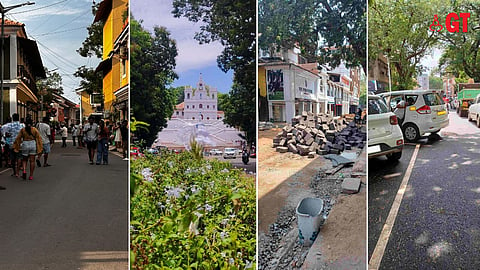

Over the last couple of years, we have been fed the concept of a "smart city" by urban planners and city fathers, so much so that the citizens of Panjim were even requested to bear the inconvenience due the many works carried out under the project.
While the works are nearing completion, citizens, who bore the discomfort of dust-noise pollution and traffic congestion, are looking forward to the much-promised smart city. However, the reality of a swank and urbanised landscape is far from reality.
Panjimites are wondering whether the sacrifices they made to see their city transformed were worth it. At this juncture, many questions come to mind. And the main one is – does making Panjim beautiful require it to be smart?
With its charming riverfront, beautiful gardens and colonial-era architecture, Panjim is a big draw for tourists. So, while weighing beauty against smart, the scale easily and naturally tilts towards beautiful. The city's beauty lies in its timeless charm and natural grandeur.
Look at the city today. All that we have seen is the relentless construction of pavements in the name of a smart city. No doubt, we require walkable pavements, but not at the cost of changing the city's character and choking the roots of its trees.
In the pursuit of smartness, many trees were hacked down despite the fact that trees are a city's defence in the face of global climate change. And there were no justifications offered. If the trees were cut down to widen roads for cars, then this contradicts the city's goal of traffic decongestion.
Look at most of the city's roads struggling to break free of congestion. Double parking is the order of the day on the 18th June Road. Also, there has been no concrete attempt made to decongest some of the interior roads in the city.
People were sold a vision of a decongested Panjim after the completion of the smart city works. But this has remained a pipe dream. Nothing has changed in the real sense, except that we now have a smart city headquarters that is a truly admirable space.
The smart city headquarters, located in a prime spot with some of the most panoramic views of the Mandovi River, is an architectural marvel. However, it doesn't represent the needs of the city. It fails to resonate with the day-to-day realities and desires of the residents it aims to serve.
Panjim smart city looks more like a political aspiration than a genuine community-driven transformation. The smart city officials never paid heed to many of the citizens' protests because those within were driven by ambitions rather than the needs of the people.
In its efforts to make the city more modern, the planners have failed to add value to the city and instead have prioritised cars over people. Why else, as you would witness in the daytime, is the city choked with vehicles of all kinds?
There have been no attempts to set up cycling lanes to coexist with traffic as well. Panjim missed a golden opportunity to integrate cycling into the cityscape to improve urban mobility and drive home the point of a sustainable dwelling place.
There has been no attempt to create streets that encourage social interaction and ecological responsibility.
When we all know cycling is the way forward, it always gets a low-status reception because we have prioritised comfort over effort. It is a car-centric culture that's ruling our minds and taking us in a different direction.
If we take a very close look at the city, it's very hard to shake off the feeling that we have been handed a cycle of repetition, which means the smartest thing that has been accomplished is rebranding what was already there.
Pavements have been upgraded and every other project has been plastered with the word "smart". Despite all the work and all the suffering, very little feels truly new and smart.